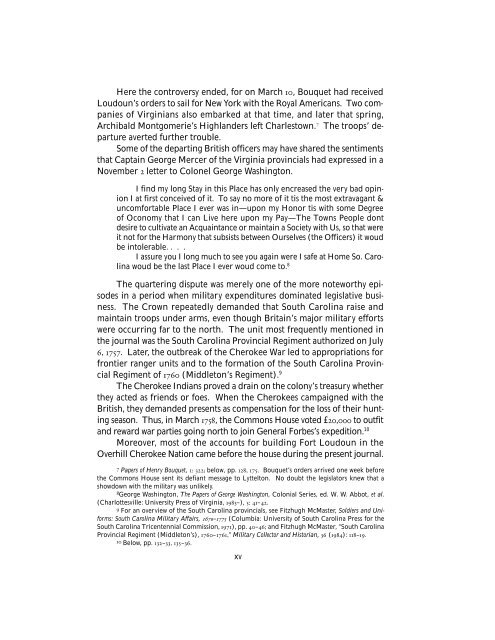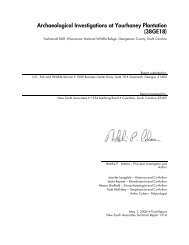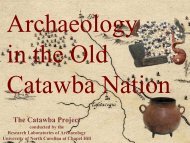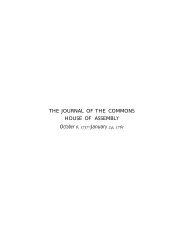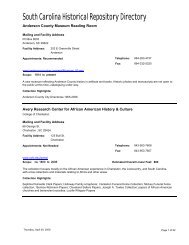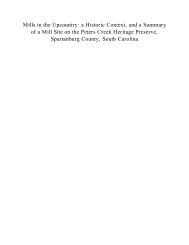The Journal of the Commons House of Assembly
The Journal of the Commons House of Assembly
The Journal of the Commons House of Assembly
Create successful ePaper yourself
Turn your PDF publications into a flip-book with our unique Google optimized e-Paper software.
Here <strong>the</strong> controversy ended, for on March 10, Bouquet had receivedLoudoun’s orders to sail for New York with <strong>the</strong> Royal Americans. Two companies<strong>of</strong> Virginians also embarked at that time, and later that spring,Archibald Montgomerie’s Highlanders left Charlestown. 7 <strong>The</strong> troops’ departureaverted fur<strong>the</strong>r trouble.Some <strong>of</strong> <strong>the</strong> departing British <strong>of</strong>ficers may have shared <strong>the</strong> sentimentsthat Captain George Mercer <strong>of</strong> <strong>the</strong> Virginia provincials had expressed in aNovember 2 letter to Colonel George Washington.I find my long Stay in this Place has only encreased <strong>the</strong> very bad opinionI at first conceived <strong>of</strong> it. To say no more <strong>of</strong> it tis <strong>the</strong> most extravagant &uncomfortable Place I ever was in—upon my Honor tis with some Degree<strong>of</strong> Oconomy that I can Live here upon my Pay—<strong>The</strong> Towns People dontdesire to cultivate an Acquaintance or maintain a Society with Us, so that wereit not for <strong>the</strong> Harmony that subsists between Ourselves (<strong>the</strong> Officers) it woudbe intolerable. . . .I assure you I long much to see you again were I safe at Home So. Carolinawoud be <strong>the</strong> last Place I ever woud come to. 8<strong>The</strong> quartering dispute was merely one <strong>of</strong> <strong>the</strong> more noteworthy episodesin a period when military expenditures dominated legislative business.<strong>The</strong> Crown repeatedly demanded that South Carolina raise andmaintain troops under arms, even though Britain’s major military effortswere occurring far to <strong>the</strong> north. <strong>The</strong> unit most frequently mentioned in<strong>the</strong> journal was <strong>the</strong> South Carolina Provincial Regiment authorized on July6, 1757. Later, <strong>the</strong> outbreak <strong>of</strong> <strong>the</strong> Cherokee War led to appropriations forfrontier ranger units and to <strong>the</strong> formation <strong>of</strong> <strong>the</strong> South Carolina ProvincialRegiment <strong>of</strong> 1760 (Middleton’s Regiment). 9<strong>The</strong> Cherokee Indians proved a drain on <strong>the</strong> colony’s treasury whe<strong>the</strong>r<strong>the</strong>y acted as friends or foes. When <strong>the</strong> Cherokees campaigned with <strong>the</strong>British, <strong>the</strong>y demanded presents as compensation for <strong>the</strong> loss <strong>of</strong> <strong>the</strong>ir huntingseason. Thus, in March 1758, <strong>the</strong> <strong>Commons</strong> <strong>House</strong> voted £20,000 to outfitand reward war parties going north to join General Forbes’s expedition. 10Moreover, most <strong>of</strong> <strong>the</strong> accounts for building Fort Loudoun in <strong>the</strong>Overhill Cherokee Nation came before <strong>the</strong> house during <strong>the</strong> present journal.7 Papers <strong>of</strong> Henry Bouquet, 1: 322; below, pp. 128, 175. Bouquet’s orders arrived one week before<strong>the</strong> <strong>Commons</strong> <strong>House</strong> sent its defiant message to Lyttelton. No doubt <strong>the</strong> legislators knew that ashowdown with <strong>the</strong> military was unlikely.8 George Washington, <strong>The</strong> Papers <strong>of</strong> George Washington, Colonial Series, ed. W. W. Abbot, et al.(Charlottesville: University Press <strong>of</strong> Virginia, 1983–), 5: 41–42.9 For an overview <strong>of</strong> <strong>the</strong> South Carolina provincials, see Fitzhugh McMaster, Soldiers and Uniforms:South Carolina Military Affairs, 1670–1775 (Columbia: University <strong>of</strong> South Carolina Press for <strong>the</strong>South Carolina Tricentennial Commission, 1971), pp. 40–46; and Fitzhugh McMaster, “South CarolinaProvincial Regiment (Middleton’s), 1760–1761,” Military Collector and Historian, 36 (1984): 118–19.10 Below, pp. 132–33, 135–36.xv


